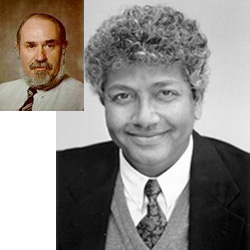Recent Stories
- Businesses urged to tap into science and technology young talent
- Digital relay baton enables remote crowd cheering of athletes
- Health Innovation Campus moves a step closer
- £7.1 million R&D boost for North West businesses
- Centre of excellence created for the next industrial revolution
- Artificial intelligence toolkit spots new child sexual abuse media online
- Strategic partnership set to help plug cyber security skills gap
- What your choice of smartphone says about you
- InfoLabTree: Discover the Story
- novi.digital Launch Event - 'An Event to Help Businesses Grow Online'
RSS Feeds
RSS feeds can deliver the latest InfoLab21 news and events direct to your browser without you having to visit the website.
In most browsers you can click on an RSS link and choose to subscribe to the feed to add it to your favourites or bookmarks.
Inaugural Doug Shepherd Memorial Lecture
Story supplied by LU Press Office
 Prof. Mahadev Satyanarayanan (Inset - Prof. Doug Shepherd)
Prof. Mahadev Satyanarayanan (Inset - Prof. Doug Shepherd)
One of the world's leading experimental computer scientists is to give the inaugural Doug Shepherd Memorial Lecture on May 20th.
Professor Mahadev Satyanarayanan, the Carnegie Group Professor of Computer Science at Carnegie Mellon University, has pioneered research into mobile and pervasive computing.
Professor Doug Shepherd, who died in 2006, made an enormous and lasting contribution to Lancaster University in his various leadership roles as Department Head, School Dean, and ISS Director. He made many research connections and friendships, and helped establish Lancaster's international presence in computing.
He was known and respected for his pioneering work in the field of networked and multimedia systems and was the founding Dean of the School of Engineering, Computing and Mathematical Sciences, a role which he combined with that of Director of Information Systems Policy.
In this latter role, the development of the Campus high capacity network infrastructure and the creation of the institution's High Performance Computing capability provided many Lancaster research groupings with the tools needed to help establish their international reputations.
The lecture will focus on Diamond - a new system for data exploration that is likely to be of interest to a wide cross section of the scientific community. Diamond is an open-source software platform for interactive data exploration that has been jointly developed by Intel Research and Carnegie Mellon.
Professor Satyanarayanan served for three years as the founding director of Intel Research Pittsburgh, one of four university- affiliated research labs established worldwide by Intel to create disruptive information technologies through its Open Collaborative Research model.
One outcome of his work is the open-source Coda File System, which supports distributed file access in low-bandwidth and intermittent wireless networks through disconnected and bandwidth- adaptive operation. The Coda concepts of hoarding, reintegration and application-specific conflict resolution can be found in the hotsync capability of PDAs today.
Key ideas from Coda have been incorporated by Microsoft into the IntelliMirror component of Windows 2000 and the Cached Exchange Mode of Outlook 2003. Another outcome of his work is Odyssey, a set of open-source operating system extensions that enable mobile applications to adapt to variation in critical resources such as network bandwidth and energy.
Coda and Odyssey are building blocks in Project Aura, a research initiative at Carnegie Mellon to explore distraction-free ubiquitous computing. His most recent work in this area is Internet Suspend/Resume, a hands-free approach to mobile computing that exploits virtual machine technology to liberate personal computing state from hardware.
The lecture will take place on Tuesday 20th May at 16:00 in the Management School LT1 and will be followed by a cheese and wine reception hosted by the Department.
Wed 30 April 2008
Associated Links
- Computing Department
- Inaugural Doug Shepherd Memorial Lecture - More details



